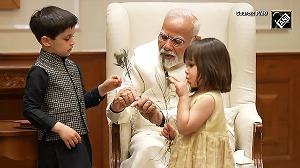A lot of controversy has arisen in Europe and in India about the proposed acquisition of Arcelor by Mittal Steel. It has shown that attitudes towards such trans-border acquisitions differ considerably among countries, and in the same country over periods of time.
About 25 years ago, in our own country, the acquisition of an Indian company by a foreign company would have drawn the ire of the public, the press and Parliament. As India has become more liberal in its attitude towards foreign investment, nobody is unduly exercised over acquisitions by foreign companies.
When Lafarge, the French cement company, acquired the cement business of Tata Steel there was no protest, either, in the Indian cement industry or the press. It was a smooth transition. Evidently, attitudes in India have evolved to be more in line with Anglo-Saxon ones.
Attitudes in France have not evolved at the same pace. There is considerable difference between the United Kingdom and the United States, on the one hand, and France, on the other, when it comes to acquisition by foreign companies.
In the UK, anyone can acquire any company, provided it has no defence implications. Harrod's, once a symbol of upper-class Britain, was bought by an Egyptian; Rolls Royce, once the pride of Britain, is now owned by Germans; even the leading English football team, Manchester United, is now owned by an American.
These are all businesses in which the nationality of the owner does not matter. An English football player is not going to play any better for Manchester United just because the club is owned by a Britisher.
In sharp contrast, any acquisition of a French company by a foreigner is generally unwelcome in France. In many ways, this could be a reflection of the entrenched inferiority complex of French business towards their Anglo-Saxon peers.
Over the last five centuries, the French and the British have been bitter rivals in their search for colonies and building up trade. For various reasons, the British succeeded more than the French. Even more galling to the French has been the fact that English has become the lingua franca of the world.
Charles De Gaulle, who was a refugee in Britain during World War II, rekindled this emotion despite the fact that he regained power in France only with the help of the Anglo-Saxon powers. He never got over what he felt was the humiliation of being a refugee in Britain. Churchill's disdain for the Frenchman did not help matters! This Gaullist complex still survives in France.
Fortunately, we in India are much more liberal and forgiving than the French, although we were colonised by the British, many of whom behaved very arrogantly. Yet Indians still retain a warm feeling towards the British and have adopted English as the main language for higher education.
This evolution owes a lot to Gandhiji and Nehru, both of whom had an innate appreciation of the decency and fairness of the common people in Britain. Their attitude towards Britain was in sharp contrast to that of De Gaulle, who owed much more to the British.
In judging the acquisition of a company in any country by a foreigner, the nationals of that country should be naturally concerned about certain matters:
It was Mr Mittal's duty to anticipate these issues and reassure people in France. He seems to have underestimated the reaction in France, which is xenophobic.
On television, Mr Mittal comes across as a decent and open individual. He could, with advantage, expose himself more in the media--more frequently and more widely, especially in France. One wonders whether he could have done better in communicating with key constituencies in continental Europe.
For instance, he could have persuaded some eminent Frenchmen to join his board. That board could then have made a public statement setting out the logic, assuring the top management, and all employees and shareholders about Mittal's plans. This would also have obviated the feeling that Mr Mittal is a purely family-centred empire builder.
Usually, competent merchant bankers provide valuable advice in such matters. One does not see much evidence of such professional support to Mr Mittal. Even now, it may not be too late to engage such people.
Another flaw in Mr Mittal's communication was with regard to the recent announcement of financial results. Mittal Steel's results showed up poorly against the impressive results announced by Arcelor. There was a need to explain this disparity. Otherwise, it would appear as if a well-run, speciality steel company is being taken over by a commodity steel company.
It is certain that Mr Mittal has an explanation and a strategy to make the combined operations more profitable than the two constituent units. This could have been spelt out more clearly and in good time by competent merchant bankers.
Young Aditya Mittal, a very intelligent and well-qualified young man, is not a credible substitute for a reputable merchant bank, which has to safeguard its reputation while advocating its client's case.
It has been very reassuring to see that the government of India and the prime minister have kept out of the controversy and behaved maturely by stating that it is for the shareholders of Acelor to decide. This balanced attitude is in sharp contrast to the pronouncements of their counterparts in France.
As the Indian economy grows, there will be more acquisitions abroad by Indian companies. Compared to the Japanese or Chinese, the next generation of Indians (like Aditya Mittal) can easily relate to Western business practices and culture because of their training and education.
In any such transaction, business logic will prevail even if it takes time. Business transcends nationality as it grows beyond borders, although individuals in the business may retain their national identities. French feelings have nothing to do with Mr Mittal being an Indian.
If it was an Englishman who tried to acquire the company, there would have been howls of protest against perifidious Albion. If it was an American who tried to acquire the company, it would have been decried by the French as part of Yankee manipulation. Ultimately, the French have to accept that the globalisation of business is here to stay; and the sooner they do so, the better it will be for France.
Do you want to discuss stock tips? Do you know a hot one? Join the Stock Market Discussion Group.








 © 2025
© 2025